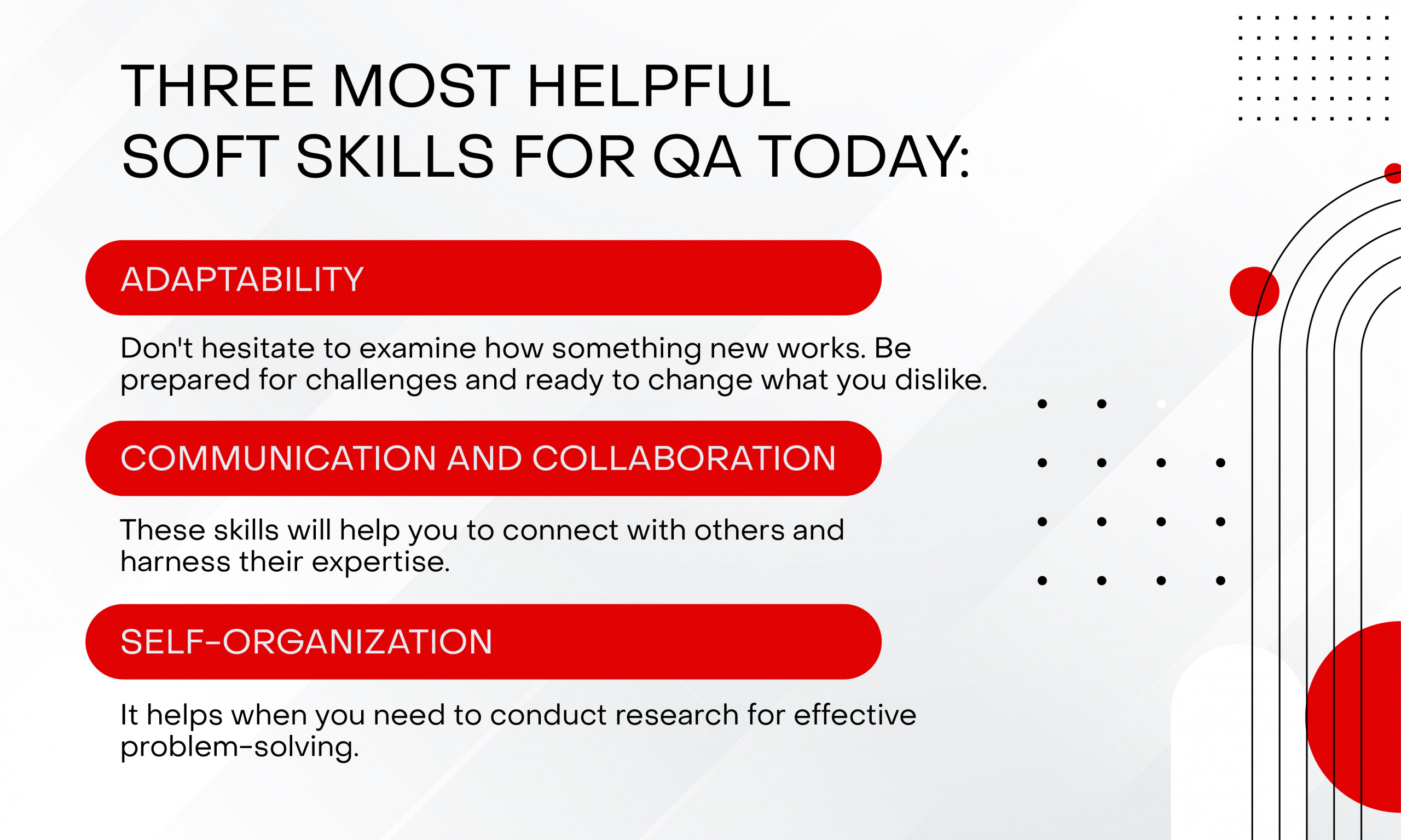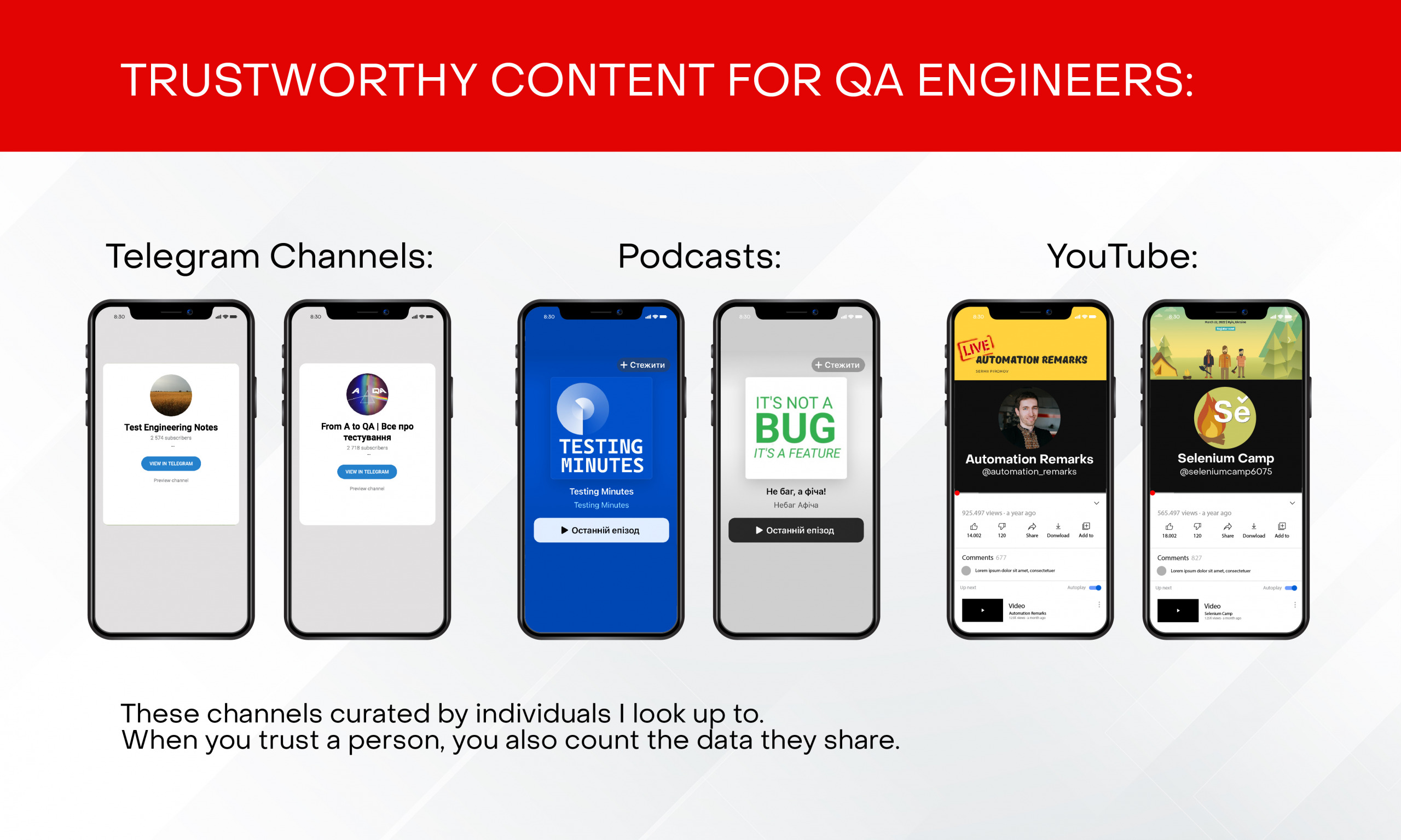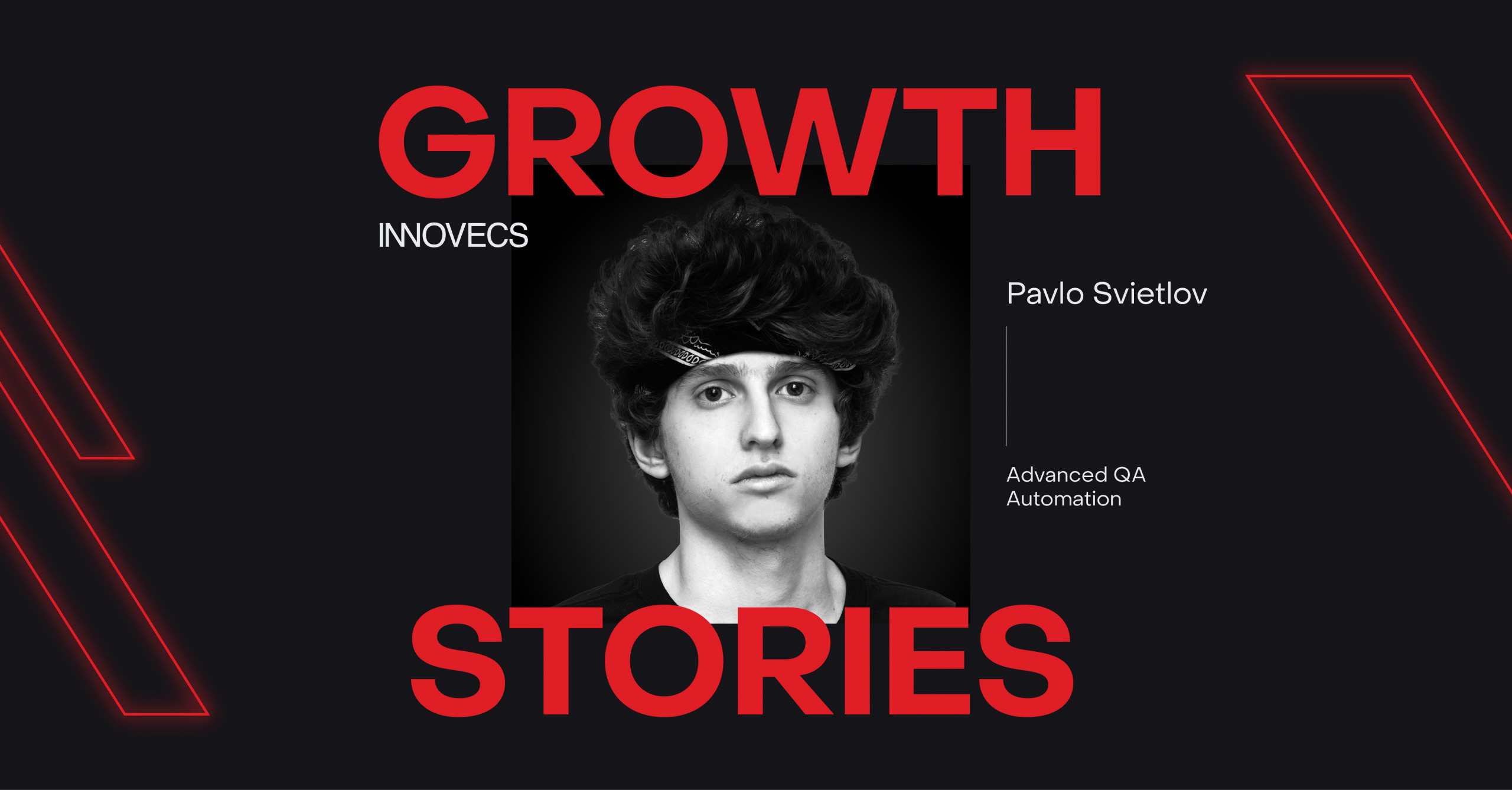My name is Nataliia Horova, and I continue to share the inspiring stories of our teammates. Today, I’d like to introduce you to Pavlo Svietlov, Advanced QA Automation.
In the interview, Pavlo shared valuable advice on choosing content wisely: avoid resources with high entry barriers or little interaction with course instructors. Also, look into individuals. When you trust a person, you also count on the data they share.
I hope Pavlo’s story will motivate you to embark on your path of personal and professional growth, nurturing self-development, and surround yourself with a supportive community.
Effective, Engaging, and Innovative experience
I’ve heard a lot about the tech industry. Once, my sister, who works in tech, mentioned QA engineering in our conversation and advised me to dive into this field. I tried, found it intriguing, and began developing myself in it. I started with a small research, read some articles to get a basic understanding, and passed free courses by a leading Ukrainian QA specialist, Artem Bykovets.
Later, I got involved in more hands-on tasks using crowd-testing platforms that were becoming popular. Despite their imperfections, these platforms allowed me to experience real work, including Front-end and Back-end development tasks, and to create some test cases.
Unlike developing or designing, QA allows you to oversee all processes together, understanding what’s happening. QA engineers, in particular, start their work as early in the development process as possible and serve as a preventive instrument during product development.
As the academic semester ended and summer began, I noticed an opportunity on a job board — the start of the first QA Manual Track at Innovecs. I thought it would be a great chance to test my skills. If I were to describe the internship in three words, it would be an Effective, Engaging, and Innovative Experience:
Effective. Participants grew more professional and proficient through the internship.
Engaging. Due to the interactive approach.
Innovative. I remember meeting Artem Bykovets near the Innovecs office and telling him about the QA Track. He highlighted its innovative nature, a combination of 50% solid theory and 50% focus on soft skills. We were divided into teams and practically applied skills from the lecture to solve tasks.
After completing the program, I conducted some interviews and joined a project. It’s been four years since I joined the Innovecs team.
Taming the Inner Critic
Like anyone else, I face challenges in my work and personal life. It’s crucial to reflect and understand the problem. Try to analyze it. If you can’t figure it out, ask for help or set it aside for a while; the decision will eventually come.
When considering the impostor syndrome phenomenon, it’s crucial to understand that individuals might not openly state, “I’m experiencing impostor syndrome,” yet their behaviors and actions frequently serve as a hint. Drawing from my personal experience and those in my circle, a few admitted to it, while some chose not to. When someone cannot acknowledge their strengths and focuses only on weaknesses, this lack of self-awareness can trigger self-doubt and impostor emotions. Focusing on soft skills to counter these challenges (burnout, impostor syndrome, and all the obstacles tied to emotional well-being) is essential.
In all situations where you feel uneasy and realize it’s related to emotional struggles, try to classify what it is — burnout or impostor syndrome. If you can’t, someone in your environment — a manager, teammate, or friend — can point out your concerns.
Personally, I always turn to Cheslav Novytskyi, an Engineering Manager at Innovecs, who possesses extensive soft skills and experience. He can propose invaluable insights from an observer’s perspective.
When the pandemic began, understanding if everything was okay became challenging, especially when working alone at home with limited social interaction.
There are numerous articles on how to deal with impostor syndrome or burnout, but here’s the catch. Someone reading these articles might recognize they’re burnt out or experiencing impostor syndrome, but they might lack the energy to understand what they need to do. Thus, these articles might not be that helpful. The simplest way to comprehend something is through in-person interaction rather than some writing or lectures. Meeting someone face-to-face is more concrete.
Overcoming Challenges

The advice here varies depending on who the reader is. If you’re a Junior or a specialist who doesn’t have a job, the first step is to find a job. This is how you begin to develop in that direction.
All advice boils down to examining the market and understanding the required skills. In today’s job market, some positions, besides technical skills, demand interview skills. That’s where adaptability comes into play — a skill I recommend having and nurturing. It’s about being willing to explore and try new things. Don’t hesitate to examine how something new works, explore different professions, and adapt. Be prepared for challenges and ready to change what you dislike.
From a QA perspective, the role involves process improvement, error identification, and effective problem-solving. Communication and collaboration skills are essential, as they determine what you can contribute and who can assist you. Even if you have a technical task, it all begins with soft skills. Want to learn something new? You need to find out about it from somewhere: ask someone — communication; research online — self-organization. From my experience, these skills are more helpful in both life and work.
For those developing or learning in the technical area, try not to learn in isolation. Most of us need a role model or an environment to seek advice from and observe examples. Don’t limit yourself to mentors alone; consider learning platforms like InnoCamp. We always worked in teams, switching them around to avoid becoming too used to one another and to learn how to adapt to different individuals.
However, when you start alone, you won’t know how many professionals are around you, their strengths and weaknesses, etc. At this very moment, the impostor syndrome begins to take root. Syndrome equals isolation.
Choose Content Wisely
The internet is full of content, and due to the tech world becoming a kind of golden thread, information and noise are abundant online. Not all info is lousy, but very few courses will suit your preferences. There’s a lot of misinformation out there. You might find someone who’s worked as a Senior for three years but is teaching courses despite needing more experience to teach or share. Sometimes, it seems like everyone is focused on money rather than the value they can provide to others.
I faced a similar situation as a Senior for two years; I received a lot of offers to become a lecturer, but I declined because I wasn’t ready to take on the responsibility of teaching others, especially considering the array of topics you need to cover on a course. How can you teach when you realize you still have much to learn? It’s not just about impostor syndrome. There are numerous courses. A few years ago, out of 100 courses, I selected the five most popular, but only one turned out to be valuable. That’s 1 out of 100.
It’s not just about being unprofessional or sometimes dealing with bad people. Offering courses and sharing information is a profession in itself. A great engineer might not necessarily excel in sharing material. To convey information effectively, it takes more than just being an exceptional specialist; you also need the art of seamless communication. Sometimes, blending a persuasive presentation with a compelling speech can be more practical. Images are often better perceived by many, and that’s something worth considering, too.
Trustworthy Sources
For beginners and those with limited expertise, avoid resources with high entry barriers or little interaction with course instructors. Some materials may be overly advanced or unnecessary. Therefore, I’d recommend exploring options other than books or courses, particularly if you’re new to tech and working with different cultures.
I’d suggest looking into individuals. I prefer the role-play model, where you have behavioral models or stories from people you can relate to. For me, this includes both innovecsers and people outside the company.
Here’s what I’d like to introduce to you, some channels I trust:
Podcasts: Testing Minutes; It’s not a bug, it’s a feature
YouTube: Automation Remarks; Selenium Camp
Telegram Channels: From A to QA; Test Engineering Notes

I like these channels because they’ve been curated by individuals I already trust and look up to. What they recommend will definitely suit me, and I’ll benefit from it. When you trust a person, you also count on the data they share.
AI Tools and QA
When discussing AI tools in the current context, they serve as complementary instruments rather than outright replacements for specific professions. They eliminate certain tasks, but replacing QA’s multifaceted role with a single tool is incredibly challenging. People are still figuring out where AI fits optimally at this stage of tech development. The AI approach has always been present in tools but has evolved, reaching new levels. It streamlines a development cycle, similar to how it does in design or engineering, yet it doesn’t replace an entire job. Instead, it optimizes time usage.
Balancing Idealism and Realism
Don’t be an idealist and learn how to switch off a particular skill when things don’t work out. Take setbacks in stride. Some suggest banging your head against the wall until it breaks. However, sometimes, it only breaks through once you’ve gained enough experience. There will be moments and situations where you must take action. It won’t always work, and it won’t always be perfect. Andriy Poddubny, our Software Development Director, once told me that things don’t always have to match the books. Every process can be improved or approached differently. One book might tell you how things should look, while another would offer an option that suits you better. The truth lies somewhere in between (learning to analyze). So, take your time with ideals, standards, or norms. Consider the reality.
In conclusion, I want to thank Pavlo for sharing this remarkable journey and insights.
Stay tuned for more captivating stories.
